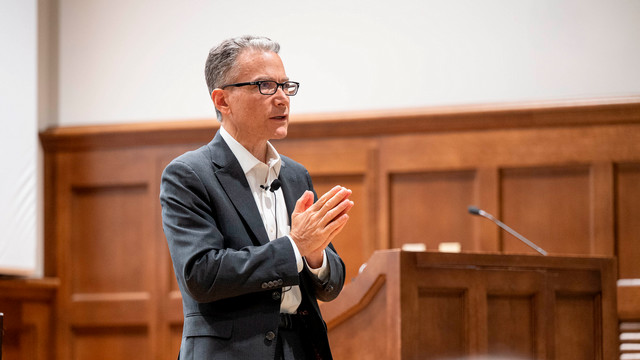The pursuit of happiness
Jeffrey Rosen, president and CEO of the National Constitution Center, delivered “The Pursuit of Happiness,” the Jepson School of Leadership Studies’ inaugural lecture in leadership and the humanities, on Sept. 9 in Ukrop Auditorium.
In her welcoming remarks, Dean Sandra Peart thanked an anonymous donor for generously funding what will be an annual lecture, whose goals are twofold: “First, we aim to help students understand how classical texts on leadership have influenced the course of leadership history and remain relevant today. Second, we will build community by ensuring that all students in the introductory Leadership and the Humanities course — which will soon be renamed Historical Foundations of Leadership — have a common text to read and discuss.”
This year, students in all sections of the introductory class are reading excerpts from Rosen’s 2024 New York Times best-selling book, The Pursuit of Happiness: How Classical Writers on Virtue Inspired the Lives of the Founders and Defined America.
The Declaration of Independence names the pursuit of happiness as a God-given inalienable right. But while many in contemporary society equate the pursuit of happiness with self-gratification, America’s Founding Fathers thought of it in terms of life-long learning and self-improvement, Rosen told the audience.
“The Founders defined happiness not as feeling good but as being good,” the constitutional scholar said.
They looked to classical moral philosophers for guidance on how to lead a good life. To understand how classical philosophy affected the Founders and the trajectory of the new nation, Rosen said he too began to read ancient Greek and Roman texts. Doing so changed his understanding of happiness.
“The core of classical moral philosophy is impulse control,” he said. “We must moderate our immediate desires in order to achieve our long-term goals — this is the essence of virtue.” He attributed George Washington’s greatness to self-mastery and his ability to put the common good above self-interest.
Both in a lunchtime discussion with leadership studies students and in his lecture, Rosen stressed the importance of deep reading to cultivate life-long learning and ensure a healthy democracy. Citing the precipitous decline of book reading in the United States, he challenged students and others to dedicate time each day to reading books rather than surfing social media.
“James Madison felt the whole future of America depended on citizens reading,” he said, noting that the Founders and most U.S. presidents have been prodigious book readers.
“The Founders betrayed their ideals in so many ways, but they acknowledged their hypocrisy and maintained their dedication to life-long learning,” Rosen said, adding that life-long learning as a path to self-improvement is an ideal worth emulating.
“Civics isn’t just let’s get along and be nice to each other,” he said. “It’s about deep reading and learning from history.”
